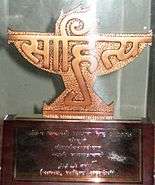K. P. Appan
Karthikayil Padmanabhan Appan (25 August 1936 – 14 December 2008), better known as K. P. Appan, was a renowned literary critic in Malayalam. Born in Alappuzha (Alleppey), Kerala, Appan worked as a Professor of Malayalam literature at SN College, Kollam, Kerala.
K. P. Appan | |
|---|---|
 | |
| Born | Karthikayil Padmanabhan Appan August 25, 1936 Alappuzha, Kerala |
| Died | December 14, 2008 (aged 72) Kayamkulam, Kerala |
| Occupation | literary critic |
| Parent(s) | Poonthoppil Padmanabhan, Karthiyani |
Biography
Karthikayil Padmanabhan Appan was born to Poonthoppil Padmanabhan and Karthiyani in Alappuzha on 25 August 1936.[1] He had his schooling at Sanadana Dharma Vidyalaya there and graduation at SD College, Alappuzha. He took his post-graduation from Maharaja's College, Ernakulam.[2] Appan began his career as a high school teacher and then joined UC College, Aluva, as a lecturer in Malayalam. Later he joined SN College, Cherthala, and then got transferred to SN College, Kollam, in 1972. He retired from there in 1992.[3]
K. P. Appan died at a private hospital in Kayamkulam on 14 December 2008. He had been battling with cancer for almost three years.[1]
Writing
Appan started his writing while Malayalam literature was slowly transiting from neo-classic socialist realism to modernism. New writings of O. V. Vijayan, M. Mukundan, Kakkanadan etc., which focus on the alienation of the individual and related anguish was unsettling to conventional critics like Joseph Mundassery, Kuttikrishna Marar etc. Their ageing literary sensibilities failed to take note of and evaluate the writings of younger generation leading to some sort of stagnation in literary criticism. Appan's entry into the Malayalam literary world at this juncture was like fresh air to a closed room. Appan pointed out that the new generation writers are impatient with existing reality as they considered writing to be an attempt to create new realities. Appan justified the liberal use of myths and metaphors by the new writers. His first book Kshobhikkunnavarude Suvisesham (Gospel of the Angry) opened a new vista in Malayalam literary criticism. Soon he became the messiah of new writing in Malayalam. Liberal values and existentialist philosophy as expounded by Immanuel Kant, Søren Kierkegaard, Jean-Paul Sartre, Albert Camus etc. found its expression in Malayalam through the genius of K. P. Appan.
Appan had written over 20 books and most of them had turned out to be subjects of interesting debate. He was one who proved to the literary world that literary criticism was by itself a form of delightful literature. He is widely seen as the one who launched the trend of new criticism in Malayalam literature. He introduced modern European and Eastern literary visions in Malayalam literary criticism.[4] Some of his works were Kshobhikkunnavarude Suvisesham (1972), Thiraskaram (1978), Kalahavum Viswasavum (1984), Marunna Malayala Novel (1988), Kalapam, Vivadam, Vilayiruthal (1992) Malayala Bhavana Mullyangalum Sangharshangalum (1992), Bible Velichathinte Kavacham (1994), Penayude Samaramukhangal (1995), Samayapravahavum Sahithyakalayum (1996), Abhimukha Sambashanangal (1997), UtharadhunikathaVarthamanavum Vamsavaliyum (1997).
Awards and honors
In 2008, K. P. Appan won the Kendra Sahithya Academy Award for his collection of essays in Malayalam, Madhuram Ninte Jeevitham. The award was announced after his death.[5]
| # | Title | Title in Malayalam |
|---|---|---|
| 1 | Kshobhikkunnavarude Suvisesham | ക്ഷോഭിക്കുന്നവരുടെ സുവിശേഷം |
| 2 | Kalahavum Viswasavum | കലഹവും വിശ്വവും |
| 3 | Malayala Bhavana: Mullyangalum Sangharshangalum | മലയാള ഭാവന - മൂല്യങ്ങളും സംഘർഷങ്ങളും |
| 4 | Varakalum Varnangalum | വരകളും വർണങ്ങളും |
| 5 | Bible: Velichathinte Kavacham | ബൈബിൾ - വെളിച്ചത്തിന്റെ കവചം |
| 6 | Kalapam, Vivadam, Vilayiruthal | കലാപം , വിവാദം, വിലയിരുത്തലുകൾ |
| 7 | Samayapravahavum Sahithyakalayum | സമയപ്രവാഹവും സാഹിത്യകലയും |
| 8 | Katha: Akhyanavum Anubhava Sathayum | കഥ: ആഖ്യാനവും അനുഭവ സത്യവും |
| 9 | Utharadhunikatha: Varthamanavum Vamsavaliyum | ഉത്തരാധുനികത: വർത്തമാനവും വംശാവലിയും |
| 10 | Innalekalile Anveshanaparishodanakal | ഇന്നലെകളിലെ അന്വേഷണപരിശോധനകൾ |
| 11 | Vivekashaliyaya Vayanakkara | വിവേകശാലിയായ വായനക്കാരാ |
| 12 | Rogavum Sahithyabhavanayum | രോഗവും സാഹിത്യഭാവനയും |
| 13 | Charithrathe Aghadahamakkiya Guru | ചരിത്രത്തിലെ അഗാധമാക്കിയ ഗുരു |
| 14 | Swargam theernnu pokunnu narakam nilanilkunnu | സ്വർഗം തീർന്നു പോകുന്നു നരകം നിലനിൽക്കുന്നു |
| 15 | Thiraskaram | തിരസ്കരണം |
| 16 | Marunna Malayalam Novel | മാറുന്ന മലയാളം നോവൽ |
| 17 | Penayude Samaramukhangal | പേനയുടെ സമരമുഖങ്ങൾ |
| 18 | Maduram Ninte jeevitham | മധുരം നിന്റെ ജീവിതം |
| 19 | Abhimuka Sambhashanakal | അഭിമുഖ സംഭാഷണങ്ങൾ |
| 20 | Charithrathe Ningalkoppam Kootuka | ചരിത്രത്തെ നിങ്ങൾക്കൊപ്പം കൂട്ടുക |
References
- Ṭi. Ke Santōṣkumār (2013). K.P. Appan: life story. Kēraḷa Bhāṣā Inst̲it̲t̲ūṭṭ. ISBN 978-81-7638-310-3.
- Staff (15 December 2008). "സാഹിത്യ നിരൂപകന് കെ.പി അപ്പന് അന്തരിച്ചു". malayalam.oneindia.com (in Malayalam). Retrieved 14 April 2019.
- "K P Appan - Malayalam writer Literay critic". www.alappuzhaonline.com. Retrieved 14 April 2019.
- Nalini Natarajan; Emmanuel Sampath Nelson (1996). Handbook of Twentieth-century Literatures of India. Greenwood Publishing Group. pp. 202–. ISBN 978-0-313-28778-7.
- "Sahitya Akademi awards for 7 novelists". The Hindu. 24 December 2008. Retrieved 24 December 2008.
Further reading
- Rajakrishnan, V. (2009). "Remembering K.P. Appan: The Critic as Cultural Hero". Indian Literature. 53 (2 (250)): 186–190. JSTOR 23348056.
- Sivaprasad Ponnan (2012). "Modernism in malayalam criticism a study with special reference to K P Appan V Rajakrishnan R Narendraprasad". hdl:10603/147694. Cite journal requires
|journal=(help)
External links
- Kutty, K M Ajir (2009). "K.P. Appan: Readable Criticism at a Premium". Indian Literature. 53 (2 (250)): 191–193. JSTOR 23348057.
